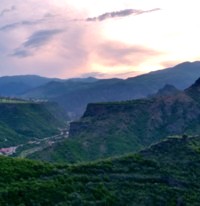Dilijan
The next day presented another challenge for the coach taking us to the next place of interest, the resort town of Dilijan, having been turned back because our first route was impassable by large vehicles.
This was the alternative - the good road
Near Dilijan we were scheduled to have a traditional lunch at another family home. This time in a religious community - the Molokan people - the largest religious minority in Armenia. They're Protestants, exiled from Russia in the 19th Century. As we quickly discovered in Russian supermarkets in a McCafé, 'moloko' is milk (you know - to put in your: кофе - kofe - café).
So these Protestants have little to do with Luther and his 95 theses. They have their origins a lot earlier in the 11th century and the Christianisation of Turkic migrants to Russia, from Mongolia and Siberia, whose traditional diet relied heavily on dairy products.
The Orthodox Church in Russia stipulates 200 days of fasting during which milk drinking is prohibited*. A dispensation from this rule at their Conversion to Christianity set the Molokans apart and they soon gained outcast status, acquiring the, initially pejorative, name, and obliging them to turn to the Scriptures for inspiration rather than to the Church.
*I don't know how Russian cows coped - don't they need to be milked every day? Perhaps dairy farmers made cheese during the fast?
By the time of Catherine the Great the Molokans were a barely tolerated minority who practiced the biblical (Protestant) sacraments collectively, within their own community, making their marriages illegal in the eyes of the Russian Church. Worse, they were opposed to serfdom (as slavery) and were pacifists, refusing to fight in the Tsar's wars.
Anyway, like other Protestants they were Evangelical and troublesome in a country where the Tsars relied on the Orthodox Church for their 'divine' authority to rule. Accused of heresy in the 19th Century they were rounded up and expelled to a remote part of the Empire - the Caucasus.
Our tour group turned out to be very interested in their religious beliefs, it was raining outside and, like the Mormons, they were more than happy to share. These principles seemed quite familiar: they're based on scripture and on direct personal access to God, without the intercession of a priesthood.
In the Christian spectrum of beliefs they are said to resemble Presbyterians, although the evolution of their principles preceded Calvin by several centuries. Reading from the same songbook, I suppose.
In this they received approbation from at least two of our more evangelical compatriots. No doubt Australia's new Prime Minister, 'Scomo', would also be singing from that songbook.
Anyway, they showed us how they make bread in a traditional clay oven, these not horizontal as in Tajikistan, but interestingly set into the ground, like an elaboration of the winemaking vessels in Georgia. The lunch, as always in Armenia, was good too.
As we left the village we encountered a Molokan wedding
Despite their intimate interactions with the Trinity it had not been blessed with perfect weather
At Dilijan we were again pleasantly surprised by the first really modern accommodation in this somewhat dilapidated country, that we were coming to like a lot, principally because of the people we were meeting and their evident ability to make the most of anything thrown at them.
Best Western - Dilijan - our first really modern accommodation in Armenia
It featured an impressive PV solar installation of which this is part
The much rubbed threesome in town is a monument to the heroes of the Soviet era comic film: Mimino
with which some on our bus were enthusiastically familiar - it vaguely rang a bell
As can be seen from the images it had been raining and was sodden underfoot, nevertheless hardier among us decided to go ahead with the promised hike up from the bus accessible road into the Dilijan National Park to the Haghartsin Monastery. On a nice fine day on a dry track this would have been a stroll in the park but in the rain the track was more like a stream, with exceptionally slippery mud, so that in places it was on pace forward, slide two back. At last, most of us made it to the Monastery and its remaining Church. Then, although the rain had stopped, getting back down, without falling over in the mud, presented a new challenge. After that the hotel was certainly welcome and I, at least, felt as if I'd been out in the countryside.
The remaining Church of the Haghartsin Monastery
the rain had stopped by then but my lens had not recovered

